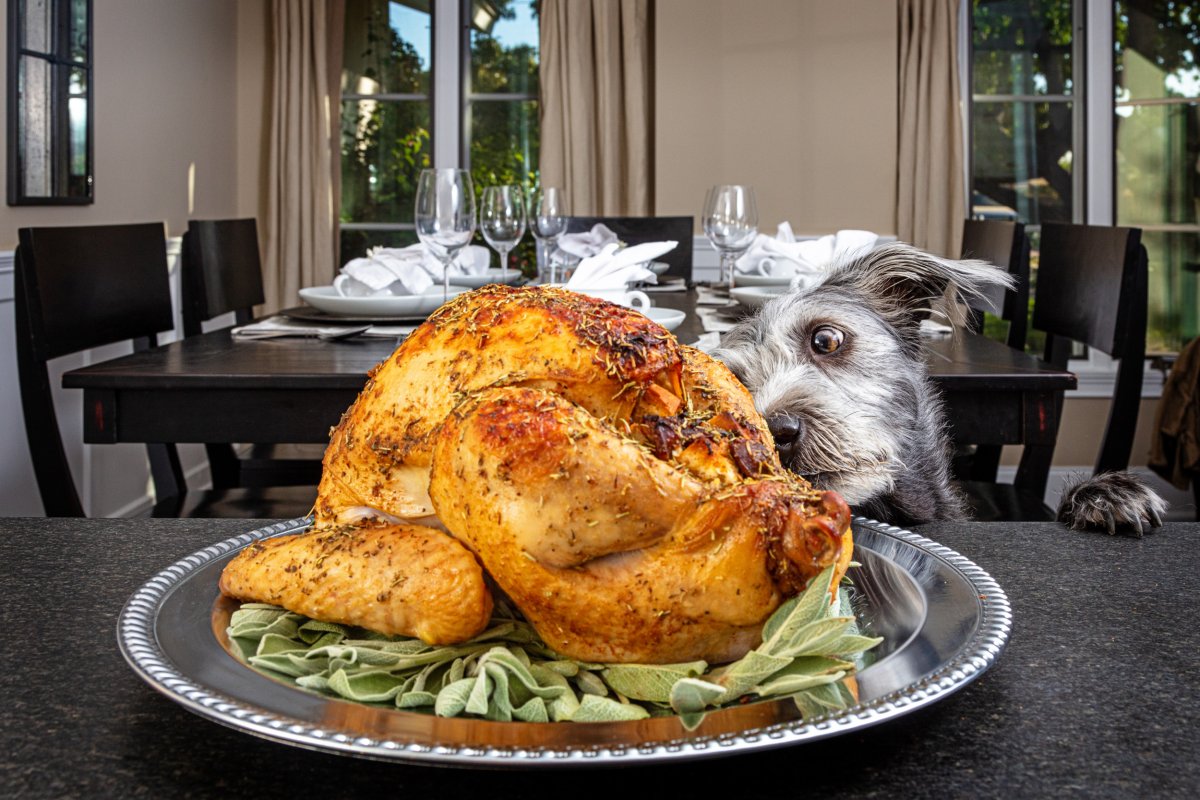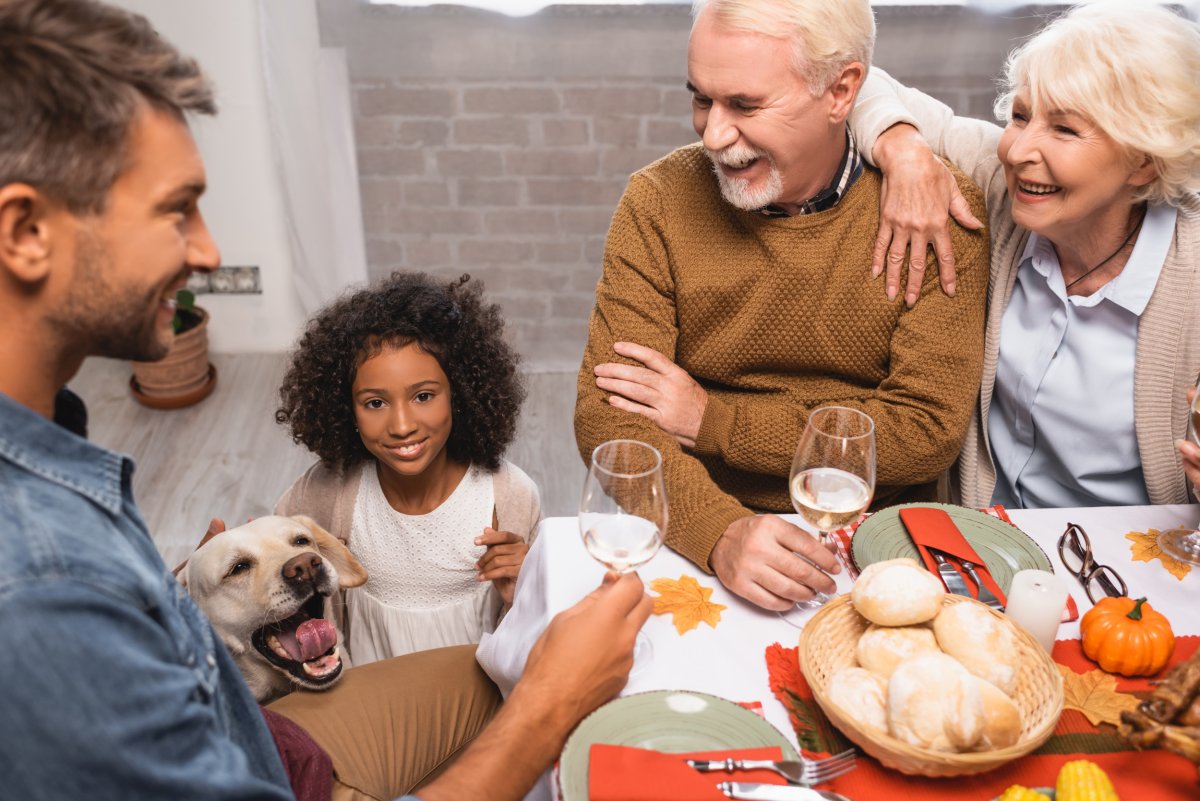For most people, Thanksgiving is a time to celebrate with friends and family, indulging in traditional foods like turkey, ham, and the much-feared Brussels sprouts.
Although your dog may try to guilt-trip you into giving them a nibble or two, it's important that you take into account their sensitive stomach when giving them any of your Thanksgiving spread.
Dogs' digestive system is very different to ours, so typical human food is way too rich and fatty for a dog to properly digest, and eating it can lead to vomiting, diarrhea, and even more severe conditions like pancreatitis.
But not all Thanksgiving foods are off the table for your pet. In fact, with moderation, you can share some of the milder, less fatty, and less seasoned foods with them.
Newsweek spoke to veterinarians to find out which Thanksgiving foods you should never give your dog, and which ones are safe for them to eat.

Which Thanksgiving Dinner Items Are Dangerous for Dogs?
While meat and vegetables are foods that most pets love to eat, the way they're seasoned makes them particularly unhealthy for your dogs. There are some foods in particular that are more dangerous than others, and according to veterinarians, you should avoid giving your dog any of the below foods this festive season:
1. Ham
Ham is a particularly fatty meat that can lead to gastrointestinal distress and pancreatitis. Giving your pet a taste of ham can land them in the vet's office pretty quickly. In fact, many ERs report a spike in cases in the days following Thanksgiving because pets eat human food and get upset stomachs.
2. Any Meat With Bones
Another terrible idea is giving your dog bones of any kind—turkey, ham, etc. Dr. Carly Fox, senior veterinarian at Schwarzman Animal Medical Center, told Newsweek that although we commonly associate dogs with eating bones, they can be quite dangerous. Ingesting bones can cause gastrointestinal upset, leading to vomiting and diarrhea.
While rare, they can also cause a gastric or intestinal obstruction. However, more commonly, they lead to an esophageal obstruction, which necessitates emergency endoscopic removal and can be difficult to diagnose.
3. Raisins/Grapes/Currants
These common ingredients used in a typical Thanksgiving dinner are toxic to dogs. Ingestion of even a single grape can lead to acute kidney injury. If your dog ingests a grape, you need to seek emergency care as soon as possible.
4. Undercooked Meat
If you give your pooch a taste of meat, turkey, or chicken especially, make sure it's cooked through. Raw or undercooked meat may contain salmonella bacteria. Dogs that become ill from a salmonella infection generally experience diarrhea that may contain blood or mucus. They will also appear more tired than usual and may have a fever or vomit.
5. Fatty Scraps
Ingesting fatty scraps, including meat, renderings, and butter, can lead to gastrointestinal upset in many dogs, and in some, it can even lead to pancreatitis, which often requires hospitalization and specialized care. In some cases, this can be life-threatening.
6. Corn
Corn itself is not bad for dogs, but a cob can cause an obstruction that can damage their digestive system, and cause an intestinal rupture. If your dog has accidentally eaten some corn, keep an eye on them. Symptoms of gastrointestinal blockage include vomiting, loss of appetite, lethargy, and pain.
7. Macadamia Nuts
This common holiday nut is toxic to dogs and can lead to vomiting and diarrhea, hind limb weakness, tremors, and hyperthermia.
8. Onions/Leeks/Garlic
These Thanksgiving staples are toxic to your dogs if ingested in large quantities. All three are members of the Allium family, and if ingested, can lead to hemolytic anemia (breakdown of red blood cells), which can necessitate hospitalization and blood transfusions.

9. Chocolate
Chocolate is a commonly known toxin to dogs, and if ingested in large quantities or high concentrations, it can cause vomiting, diarrhea, tremors, seizures, and even death.
10. Gravy
Most gravy isn't safe for pets to eat because it usually contains onion and/or garlic, which is toxic for both dogs and cats, even in small amounts. In fact, anything in the onion or garlic family (including scallions, leeks, and other similar vegetables) is a no-go.
However, according to Dr. Lauren Witter, a senior veterinarian at New York City-based Small Door Veterinary, if you've made the gravy yourself and are 100 percent sure it doesn't contain onion or garlic, and not too much salt, you can give your dog a little taste!
11. Mashed Potatoes
You should also steer clear of mashed potatoes, as they usually have too much milk and/or cream, and dogs are lactose intolerant. It could cause diarrhea and an upset stomach. If you're giving your pet sweet potatoes, check if there are marshmallows on them (some can contain the sugar substitute xylitol, which is highly toxic for cats and dogs).
12. Desserts
Many desserts may not be ideal to share with your pets as they contain large amounts of sugar and fat. For example, pumpkin pie isn't ideal for dogs because it has a lot of added sugars.
Make sure to avoid calorie-free sweeteners as they can also be toxic. If you'd like to treat your pet to a little dessert, Dr. Witter suggests giving them a small amount of fruit or a small spoonful of frozen peanut butter.
13. Cranberry Sauce and Juice
Cranberry sauce and juice are both high in sugar content, so large amounts should be avoided. However, in moderation, plain cranberries are okay for pets, although some may not like the tartness. When giving your dog dried cranberries, you should make sure not to give them any raisins or currants, which are often mixed together in packs of dry fruits and are toxic for your pet.
14. Stuffing
Stuffing is usually not safe for your furbabies because it very often contains onion or garlic, or sometimes raisins and currants. But if you've checked the packaging and are 100 percent sure your stuffing is free of any of these ingredients, you can give your pet a little bit and they'll likely love the taste!
What To Do If Your Dog Eats Human Food That's Bad For Them
While the above-mentioned foods make a great festive feast for humans, they're not safe for our pets to eat, mostly because they can either cause choking hazards or pancreatitis.
Pancreatitis is an inflammation of the pancreas that needs to be addressed by a veterinarian as soon as possible. The pancreas is the organ responsible for releasing enzymes that help your dog's digestion. When the organ is functional, the enzymes become active only when they reach the small intestine.
However, when your dog's pancreas is inflamed, the enzymes activate when they're released, causing damage to the pancreas and its surrounding tissue and other organs. Moreover, these enzymes can begin to digest the pancreas itself, causing extreme pain to your dog.
If your pet manages to get hold of something they shouldn't, it's important to seek veterinary help immediately, said Dr. Witter.
"Try to keep hold of the packaging of whatever your pet ate, if possible, as it can be helpful to know exactly what ingredients and quantities your pet has consumed. Check to see if there's a VEG (Veterinary Emergency Group) nearby, they're excellent when it comes to emergency visits."
If your pet develops diarrhea or soft stool, switching to a bland diet of boiled chicken/rice for 24-48 hours should hopefully resolve it, according to Dr. Fox. She added that if you notice blood in the stool or if the diarrhea is accompanied by vomiting, you should seek veterinary attention.
"If your dog ingests raisins/grapes, chocolate, macadamia nuts, or onions/garlic you should seek veterinary attention immediately."
Are Vets Open On Thanksgiving?
Some veterinary clinics, like Small Door, offer 24/7 telehealth over the holidays and can provide advice. The ASPCA also runs a pet poison hotline 24/7, staffed by pet toxicologists who can provide advice on any potential poisoning situation. Their service currently costs $75 per call, and they can be reached at (888) 426-4435. Alternatively, you can also reach out to the Vetted Veterinary Professionals through the Vetted app.
Which Thanksgiving Foods Are Safe For Your Dog?
While the more complex Thanksgiving dishes, packed with fats and seasonings are a no-go for your dog, a small boneless piece of cooked turkey or a spoonful of boiled pumpkin shouldn't pose a problem, as long as you don't allow them to overindulge.
1. Unseasoned Lean Meat
Dr. Anna Foster, a member of the advisory board of vet app Vetted Pet Health, told Newsweek that if your dog doesn't have a sensitive stomach, Thanksgiving options for them include small amounts of unseasoned chicken or turkey, plain white rice, and boiled potatoes, as well as plain pumpkin in small amounts. Make sure any piece of meat you give them is without skin or fat.
2. Vegetables and Fruit
Offering your dog a boiled green bean or potato, with no additives, is safe. A cut-up piece of apple is also a safe treat for your pet, and for dessert, you can add a scoop of canned pumpkin to their meal as a festive treat.
Most vegetables are safe, including broccoli, cauliflower, carrots, green beans, and sweet potato, as long as they don't have too much butter, salt, or other seasonings (like onion and garlic). Veggies can cause some gas, so you may smell some stinky toots!
Most fruits are also safe for your dogs to eat, with the exception of grapes, raisins, and currants. Fruits make for a great and nutritious treat for your pet—just ensure you remove any pits from stone fruits, as they're a choking hazard, and don't let them eat apple cores.
3. Salmon
If you're having salmon as a part of your meal, it's safe to give your pet a small portion.
4. Cheese
Cheese is generally safe for pets. Since most pets are lactose intolerant, they could have a little gastrointestinal upset with cheese, so hard cheeses that have less lactose are a better option.
If you're having a cheese platter, it's safe to give your pet a very small amount of cheese. Although Dr. Witter warns: "Make sure not to give them too much though, as the high-fat content could potentially cause pancreatitis."
5. Pumpkin
Plain pumpkin is safe and makes for a nutrient-dense and high-fiber snack when fed to your pet without any additional ingredients. However, before giving it to your pet, make sure it doesn't have any spices or seasoning, and that it's been cooked and chopped into small pieces.
You should also remove the skin, leaves, stems, and seeds, as they can be a choking hazard. Do not give your dog pumpkin pie filling, as it has a really high sugar content.
How To Keep Your Dog Away From Thanksgiving Dinner
While you should keep an eye on your dogs to make sure they don't accidentally eat any unsuitable foods, it's important that you also warn your guests about what they can and cannot give your dog from their plates.
For this reason, Dr. Foster suggested having healthy dog treats on hand for your guests to give your dog, so they aren't tempted to offer human food to your furry friends. Or alternatively, you could keep your pet in a separate room from the dining areas, to avoid any risks.
Uncommon Knowledge
Newsweek is committed to challenging conventional wisdom and finding connections in the search for common ground.
Newsweek is committed to challenging conventional wisdom and finding connections in the search for common ground.
About the writer
Maria Azzurra Volpe is a Newsweek Lifestyle Reporter based in London. Her focus is reporting on lifestyle and trends-related stories, ... Read more
To read how Newsweek uses AI as a newsroom tool, Click here.








